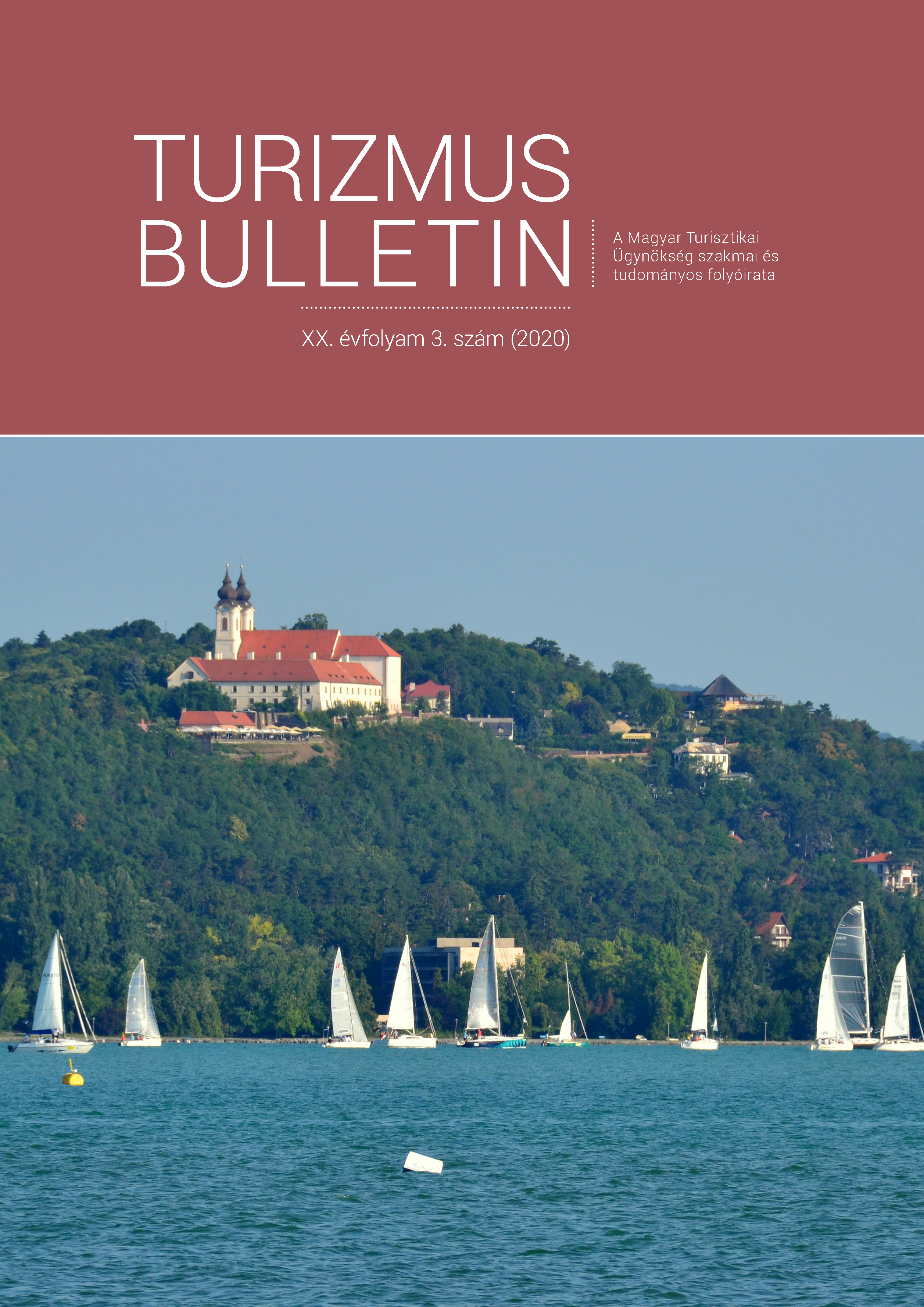Case studies on demand and supply analysis of rural gastronomic festivals in Hungary’s Southern Great Plain
DOI:
https://doi.org/10.14267/TURBULL.2020v20n3.3Keywords:
rural gastronomic festival, stakeholders, supply-demand analysis, Southern Great Plain NUTS 2 regionAbstract
The significance of gastronomic festivals is increasing both worldwide and in Hungary. Despite their role in settlement and tourism development, related scientific studies are less common, especially in the case of rural gastronomic festivals. We study their characteristics and demand–supply analysis by applying a case study approach in Hungary’s Southern Great Plain. We explore the roles and impacts of various stakeholders (organisers, local visitors and tourists) in shaping tourist demand and supply in our qualitative study. Due to a large supply of gastronomic festivals and to the continuously changing demands of their target groups, their organisers face a renewal crisis. For this reason, strategic planning with greater community participation is called for. Without this, the hosting of rural gastronomic festivals will probably lead to conflicts.
References
ALVES, H. M. B. – CERRO, A. M. C. – MARTINS, A. V. F. (2010): Impacts of small tourism events on rural places. Journal of Place Management and Development. 3(1). pp. 22–37. https://doi.org/10.1108/17538331011030257
ÁSVÁNYI K. – MITEV A. – JÁSZBERÉNYI M. – MERT M. (2019): Családok fesztiválélménye – két családbarát fesztivál elemzése. Turizmus Bulletin. 19(3). p p. 3 0 – 3 7.
BERTELLA, G. (2017): Running, walking, wining and dining in the Chianti countryside: the development of an active eno-gastronomic event and the changing role of the stakeholders. In: Cavicchi, A. – Santini, C. (eds): Food and Wine Events in Europe: A Stakeholder Approach. Routledge, London–New York. pp. 100–109. https://doi.org/10.4324/9781315796901
BIAETT, V. (2017): Organic festivity: A missing element in organic festival. In: Jepson, A. – Clarke, A. (eds): Exploring community festivals and events. Routledge, London–New York. pp. 1 7– 2 7. https://doi.org/10.4324/9781315776569
BODNÁR D. (2016): Környezeti és szociokulturális fenntarthatóság a fesztiválturizmusban. In: Jászberényi M. – Zátori A. – Ásványi K. (szerk.): Fesztiválturizmus. Akadémiai Kiadó, Budapest. pp. 55–66. https://doi.org/10.1556/9789634540083
CSURGÓ B. (2014): A vidék nosztalgiája. Kulturális örökség, turizmus- és közösségszervezés három észak-alföldi kistérségben. socio.hu. 2. pp. 1–20. DOI: 10.18030/SOCIO.HU.2014.2.1
FEHÉR I. – KÓRÓDI M. (2008): A vidéki turizmus fejlesztése. Szaktudás Kiadó Ház, Budapest.
GETZ, D. (2017): Food and wine events as permanent institutions. In: Cavicchi, A. – Santini, C. (eds): Food and Wine Events in Europe: A Stakeholder Approach. Routledge, London–New York. pp. 54–70. https://doi.org/10.4324/9781315796901
HALL, C. M. – GÖSSLING, S. (2016): From food tourism and regional development to food, tourism and regional development: themes and issues in contemporary foodscapes. In: Hall, C. M. – Gössling, S. (eds): Food tourism and regional development. Routledge, London–New York. pp. 3 – 5 7. https://doi.org/10.4324/9781315691695
HORVÁTH A. – JÓNÁS-BERKI M. – SZEIDL K. – AUBERT A. (2016): Nemzetiségi gasztrofesztiválok a Dél-Dunántúlon –stifoldertől a babfőző fesztiválig. Tu r i sz t i k a i és Vidékfejlesztési Tanulmányok. 1(1). pp. 33–45.
KALKSTEIN-SILKES, C. – CAI, L. A. – LEHTO, X. Y. (2008): Conceptualizing festival-based culinary tourism in rural destinations. In: Hall, C. M. – Sharples, L. (eds): Food and wine festivals and events around the word. Butterworth Heinemann, Oxford. pp. 80–92. https://doi.org/10.1016/B978-0-7506-8380-7.00004-X
KÓRÓDI M. – BAKOS R.-NÉ (2017): A gasztrofesztiválok, mint élménygazdasági termékek változatossága és választékossága. Gradus. 4(2). pp. 479–486.
KULCSÁR N. (2016): A szennai hurkafesztivál sikertörténete. In: Jászberényi M. – Zátori A. – Ásványi K. (szerk.): Fesztiválturizmus. Akadémiai Kiadó, Budapest. pp. 227–233. https://doi.org/10.1556/9789634540083
MAGYAR TURIZMUS ZRT. (2013): Bor és gasztronómia mint turisztikai termék. Turizmus Bulletin. 15(1). pp. 45–49.
PUSZTAI B. (2003): Megalkotott hagyományok és falusi turizmus. In: Pusztai, B. (szerk.):Megalkotott hagyományok és falusi turizmus/Invented Traditions and Village Tourism: A pusztamérgesi eset/The Pusztamérges Case. JATEPress Kiadó, Szeged. pp. 9–21.
PUSZTAI B. (2007): „Bajászlé”. Identitás, kanonizáció és márkázás a bajai népünnepélyen. In: Pusztai B. – Neill M. (szerk.): Turizmus, fesztiválok és helyi identitás. University of Edinburgh, Szegedi Tudományegyetem Néprajzi és Kulturális Antropológiai Tanszék. Edinburgh–Szeged. pp. 7–2 5.
PUSZTAI B. (2020): A rurális fesztiválszcéna a közösségi fesztiválok és a tervezett események keresztútján. In: Dobák J. – R. Nagy J. (szerk.): DOCENDO DISCIMUS. A 60 esztendős Kotics József köszöntése. Kulturális és Vizuális Antropológiai Tanszék, Miskolc. pp. 323–332.
QUINN, B. (2018): Festivals and social sustainability. In: Mair, J. (ed): The Routledge Handbook of Festivals. Routledge, London–New York. pp. 53 – 61. https://doi.org/10.4324/9781315186320
SULYOK J. (2016): A magyarországi fesztiválturizmus országos szintű marketingje. In: Jászberényi M. – Zátori A. – Ásványi K. (szerk.): Fesztiválturizmus. Akadémiai Kiadó, Budapest. pp. 97–106. https://doi.org/10.1556/9789634540083
SULYOK J. – SZIVA I. (2009) A fesztiválturizmus nemzetközi és hazai tendenciái. Turizmus Bulletin. 13(3). pp. 3 –13.
SÜLI D. – MARTYIN Z. (2017): A közösségi média szerepe a fesztiválturizmusban – a Szegedi Ifjúsági Napok és a Green Future példáján. Turizmus Bulletin. 17(3–4). pp. 24–32.
SZABÓ G. – ZÁVODI B. (2018): The wine tourism of Hungary from the point of festivals. Journal of Tourism and Hospitality Management. 4(4). pp. 74–83.
TIMOTHY, D. J. – PENA, M. (2016): Food festivals and heritage awareness. In: Timothy, D. J. (ed): Heritage cuisines: traditions, identities andtourism. Routledge, London–New York. pp. 148–165. https://doi.org/10.21747/21832242/litcomp-39rec6
VÁSÁRHELYI T. (2016): A fesztiválturizmus szinergiái. In: Jászberényi M. – Zátori A. – Ásványi K. (szerk.): Fesztiválturizmus. Akadémiai Kiadó, Budapest. pp. 44–54. https://doi.org/10.1556/9789634540083
ZÁTORI A. (2016): A fesztiválturizmus elméleti aspektusai. In: Jászberényi M. – Zátori A. – Ásványi K. (szerk.): Fesztiválturizmus. Akadémiai Kiadó, Budapest. pp. 15–33. https://doi.org/10.1556/9789634540083

